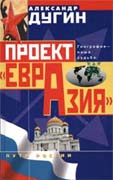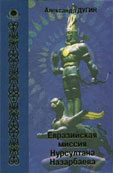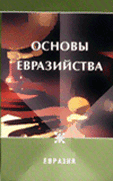 |
|
|||||
|
|
||||||
|
||||||||||||
|
Geoffrey ClarfieldRussia's new imperialists. A new breed of Russian nationalist is warping history in disturbing ways
From 1920 to 1990, the Soviet Union was governed by totalitarian communists whose regime was inspired and legitimized by the writings of Marx, Engels, Lenin, Stalin and the numerous state-supported commentators who followed them. These writers believed that "scientific Marxism" (as they variously defined it) explained all aspects of human history and culture, including the origin and development of religion, kinship, ethnicity, nations and empires, as well as the dynamics of the economy, politics, the arts and psychology.
They also believed that this system of thought contained the laws of history and that these laws predicted the ultimate downfall of Western capitalism, individualism and liberal democracy, and the international triumph of communism based on an economy of central planning and collectivization. The fact that Russia and Russian-speaking communists dominated the Soviet Union and its Eastern European and Central Asian satellite states for 70 years was justified at that time by the fact that the revolution had been started in Russia by Russians -- they considered themselves "first among equals."
Serious historians and political scientists have since demonstrated the correlation between Marxist regimes and the systematic violation of human rights, including the deportation of dissidents to death camps and the Gulag. Russian and other Marxist regimes caused the deaths of millions of their own innocent citizens.
With the rise of Perestroika and the subsequent collapse of the Soviet Empire in the early '90s, almost all Russian politicians and intellectuals rejected Marxism. One would think that the Russian and Turkic peoples of Central Asia would have proceeded by attempting to rewrite their history from an empirical, non-ideological point of view -- that they would have translated the works of Western, non-Marxist historians and anthropologists in an attempt to explain the strange and terrifying communist chapter of their history. They didn't.
The Eurasianist debate goes back to the time of Catherine the Great but crystallized in the 19th century. During that time, Imperial Russia considered itself the heir of Byzantium, from which it received Orthodox Christianity and the imperial impulse. The Russians built an empire by conquering the Turkic peoples of Central Asia and settling Siberia. The elite around the court of the czars did not consider themselves an Eastern European and Orthodox version of that other great imperial power of the time, Great Britain, but rather thought of themselves as something special.
That uniqueness was the Asian geographical spread of Russia and its domination of Central Asia. According to Russian thinkers of the time, and up until the Bolshevik Revolution in 1917, this is what made Russia different from Western Europe and special in a mystical, historical and political way. It was Russia's destiny to dominate Asia and to consider itself as Asian or Eurasian with regard to Europe and the rest of the world. They also believed that this made them morally superior to the West.
The original Eurasianist thinkers included Vasily Tatishchev (1686-1750), Nikolai Danilevsky (1822-85), Nikolai Trubetzkoy (1890-1938) and even the linguist Roman Jakobson (1896-1982). Since 1990 their work has been interpreted and modified by Neo Eurasianist writers and political activists such as Lev Gumilev (1912-1992), Aleksandr Pamarin (1924-2003) and Aleksandr Dugin, who was born in 1962. Dugin gives us a flavour of the feel of the new Eurasianism in this quote from a book he wrote in 1997:
"In principle, Eurasia and our space, the heartland Russia, remain the staging area of a new anti-bourgeois, anti-American revolution ... The new Eurasian empire will be constructed on the fundamental principle of the common enemy: the rejection of Atlanticism, strategic control of the U. S. A. and the refusal to allow liberal values to dominate us. This common civilizational impulse will be the basis of a political and strategic union."
Dugin proposes a Slavic Turkic alliance against the West. He is well known for his interest in occultism, his admiration of Reinhard Heydrich -- one of the chief organizers of the Holocaust -- and he is reputed to be close to the Russian Prime Minister and former president, Vladimir Putin. During the recent Russian invasion of the newly independent Caucasian state of Georgia, Dugin visited the secessionist Ossetians who had been supported militarily by the invading Russian army. When the Russian Duma (parliament) recognized the breakaway republic of South Ossetia, Dugin expressed this as one aspect of the "long awaited renaissance of the Russian Empire."
Marlene Laruelle, a French writer on Eurasianism, highlights the key features of contemporary Eurasian thinking:
"The different currents of Russian Neo Eurasianism that emerged in the 1990s all share a set of convictions: an assertion of cultural unity and common historical destiny of the Russians and the non-Russian peoples of Russia, the former Soviet Union or parts of Asia; the idea that the central geographical position of this space in the heart of the Old Continent inevitably entails an imperial form of political organization; a belief in the existence of cultural constants that explain the deeper meaning of contemporary political events; a rhetorical cult of national diversity combined with a dismissal of real autonomy for the minorities; and a rejection of Europe and/or the
West and/or capitalism through criticism of 'Atlanticist' domination, considered disastrous for the rest of mankind."
So much of the so-called scientific, anthropological and historical justification for the Eurasian ideology ignores the basis of modern scholarship, as we know it in the West. That is because a growing number of Russian scholars reject Western empiricism and the epistemological assumptions of our scholarship. Not surprisingly, Eurasian writers are sought out by larger and larger segments of Russian society and the ruling elite. This is shown most clearly in the exploding popularity of the writings of one of the pillars of modern Eurasianism, Lev Gumilev.
Gumilev was born in St. Petersburg on Oct. 1, 1912. His parents were members of the czarist Russian intelligentsia, both famous poets. After the revolution, his father was executed because of his opposition to the Bolsheviks. His mother was hounded and persecuted by the Bolshevik authorities despite her fame as a poet. As Gumilev was thought of as "tainted" by his parents' political sympathies, he was expelled from Leningrad University by Stalin's henchmen and spent the years from 1938-56 as a slave labourer in the Gulag.
Freed from detention after Stalin's death in 1956, he went back to the university and defended two doctoral dissertations on the history of the peoples of Central Asia. He wrote extensively, but was criticized by his colleagues for his non-Marxist approach to the ethnology and history of Central Asia. The academic authorities made it very difficult for anyone to obtain his numerous articles and publications.
Given his background, one would assume that as a non-Marxist he would have done everything possible to read Western sources on the history of Russia and Central Asia, but this is not the case. Instead, he invented an ethnology and history, which purports to explain the rise and fall of all cultures and civilizations. Gumilev's writings have numerous contradictions and would strike any North American university graduate as bizarre. Nevertheless, here are some of the ideas that have made him famous in contemporary Russian intellectual and political circles.
Gumilev believed that he had invented a new science of ethnology and that his theories were unique. He rejected historiography and the humanities as having any value in explaining the rise and fall of ethnic groups and empires. He believed that only a biological explanation would suffice. He claimed that he was a Darwinist, but few Darwinian anthropologists or historians in the West would give his theories much credence.
Gumilev believed that the formation or "ethnogenesis" of "ethnoi" or what we would call ethnic groups (and later nations and empires) is the result of a burst of chemical energy (probably from outer space). This energy gives a group of men a mysterious force that explains their collective rise and fall. He calls this principle "passionarity."
Each ethnos has a life cycle of 1,200 to 1,500 years. The whole pro-cess takes 60 generations to complete. The first stage of the "ascent" takes 300 years. The next stage, the fluorescence or "acme," as he puts, takes another 300 years. Then comes the "pivotal" or destructive stage of 150 years, then a 600 year stage of inertia, followed by a stage of eclipse and then a stage of homeostasis which implies a return to primitive savagery, which he compares to African Bushmen or Australian Aboriginals.
Somehow out of all this he explains that contemporary Russia and its empire have high "passionarity" while Europe and the West have low "passionarity." His theory includes terms like ethnos, superethnos, ethnosphere and ethnogenesis. Then there are his moral deductions from his theory of ethnogenesis and history. He believes that members of "ethnoi" should not mix -- they should marry among themselves. For the ethnoi to survive, elders must be respected, as should religious institutions and the state. Of course, the key elements here are that history is determined, the individual is second to the group, Eurasia is rising and the West is in decline.
You do not need a PhD in ethnology or anthropology to point out the vagaries and absurdities of this theory. The deeper one goes into the writings of Gumilev, the greater the contradictions. Ultimately Gumilev, like most Eurasianist thinkers, is trying to find a way of justifying the Soviet Marxist experience as a preparatory "stage" in some greater hidden process, where ultimately Russia and its allies will dominate the West. Simply recognizing Stalinism as a horrible failure and a moral catastrophe, and admitting that Russia should become more democratic, is too humiliating for Eurasianist thinkers like Gumilev, despite his personal experience of the Gulag.
Since Gumilev's death in 1992 his books have become best sellers in Russia. Hundreds of thousands of copies have been printed and sold. His books are found on almost all university reading lists dealing with history and the social sciences. The new Kazakh State University was named after him. When Vladimir Putin visited Gumilev University he said that Lev Gumilev was "the greatest Eurasianist of our times" and that "his scholarly works are a brilliant contribution ... to thinking about history."
When Canadians read about the recent violation of Arctic airspace by a Russian jet fighter, when we hear about a claim by Russia to oil wealth that we believe to be in Canadian waters, when we hear that it has planted a Russian flag under the ice of the North Pole, when we contemplate the Russian invasion of Georgia and its support for Iran's nuclear ambitions, we need to understand that these are not random events.
They are an expression of Eurasianism, the new ideology of 21st-century Russia. It is the latest version of Russian nationalism. It is hierarchical, imperial, expansive, militaristic and nondemocratic. It celebrates and endorses the authoritarian continuity between Soviet Russia and the present regime. We ignore it at our peril.
gwclarfield@yahoo.com - Geoffrey Clarfield is a Toronto based writer.
National Post (http://www.nationalpost.com/related/topics/story.html?id=1418370&p=1). |
Виды цветного металлопроката Воздушные завесы Топас 5 |
||||||||||||||||||||||||||||||||||||||||||||||||||||||


































